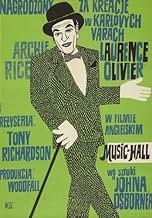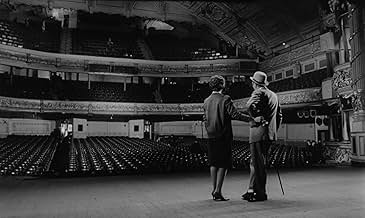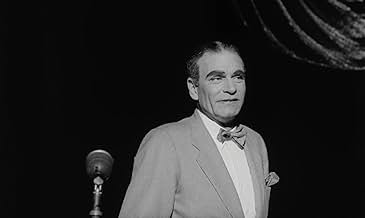IMDb रेटिंग
7.1/10
4 हज़ार
आपकी रेटिंग
अपनी भाषा में प्लॉट जोड़ेंArchie Rice, an old-time British music hall performer sinking into final defeat, schemes to stay in show business.Archie Rice, an old-time British music hall performer sinking into final defeat, schemes to stay in show business.Archie Rice, an old-time British music hall performer sinking into final defeat, schemes to stay in show business.
- 1 ऑस्कर के लिए नामांकित
- 1 जीत और कुल 5 नामांकन
Laurence Olivier
- Archie Rice
- (as Lawrence Olivier)
Brenda de Banzie
- Phoebe Rice
- (as Brenda De Banzie)
Shirley Anne Field
- Tina Lapford
- (as Shirley Ann Field)
MacDonald Hobley
- McDonald Hobley
- (as McDonald Hobley)
फ़ीचर्ड समीक्षाएं
That little song that Laurence Olivier sings through out The Entertainer as part of his musical hall act really does sum up his philosophy of life.
Outside of the classics this is Olivier's greatest role and some would not even put that qualifier on his performance. Olivier retained great affection for his role as Archie Rice. He said it contained more of the real him than any other role.
That's hard to believe because what Archie Rice is is a third rate song and dance man. His father played by Roger Livesey was a great performer back in the day. But Archie never has and never will make it to the top. Think Frank Sinatra and Frank Sinatra, Jr. and you get some idea.
He's more like Willy Loman in that he's facing his midlife crisis, knowing full well he's not really accomplished all that much. Still he plods on. Unlike Willy the luckless middle-aged salesman, Archie's full of tricks. His credit is all gone, and he's planning to woo and win a young beauty who's an airhead like her mom with the object of getting their backing for a new show. He's ready to throw over wife Brenda DaBanzie without a by your leave.
The only one who Olivier has any kind of human feelings for is his daughter played by Joan Plowright. It was in the original cast of The Entertainer that Olivier first met the woman who became the third and last Mrs. Olivier. When he was made a peer in fact Joan became Lady Olivier.
In fact from the Broadway production, Olivier, Plowright and DaBanzie were the only ones from that cast who were in the film. But some rising young talent like Alan Bates, Albert Finney, and Daniel Massey all got some good first notice in The Entertainer playing Olivier's two sons and Plowright's fiancé.
The Entertainer is a downer of a film. There ain't a middle aged man who doesn't know what Archie is going through. But our sympathies are never with him. Usually that would mean one big box office flop if the audience can't sympathize or empathize. But it's Olivier's skill as a player that makes us want to see what does become of Archie.
It's an ending, but in a very minor key. Well deserved I thought.
Outside of the classics this is Olivier's greatest role and some would not even put that qualifier on his performance. Olivier retained great affection for his role as Archie Rice. He said it contained more of the real him than any other role.
That's hard to believe because what Archie Rice is is a third rate song and dance man. His father played by Roger Livesey was a great performer back in the day. But Archie never has and never will make it to the top. Think Frank Sinatra and Frank Sinatra, Jr. and you get some idea.
He's more like Willy Loman in that he's facing his midlife crisis, knowing full well he's not really accomplished all that much. Still he plods on. Unlike Willy the luckless middle-aged salesman, Archie's full of tricks. His credit is all gone, and he's planning to woo and win a young beauty who's an airhead like her mom with the object of getting their backing for a new show. He's ready to throw over wife Brenda DaBanzie without a by your leave.
The only one who Olivier has any kind of human feelings for is his daughter played by Joan Plowright. It was in the original cast of The Entertainer that Olivier first met the woman who became the third and last Mrs. Olivier. When he was made a peer in fact Joan became Lady Olivier.
In fact from the Broadway production, Olivier, Plowright and DaBanzie were the only ones from that cast who were in the film. But some rising young talent like Alan Bates, Albert Finney, and Daniel Massey all got some good first notice in The Entertainer playing Olivier's two sons and Plowright's fiancé.
The Entertainer is a downer of a film. There ain't a middle aged man who doesn't know what Archie is going through. But our sympathies are never with him. Usually that would mean one big box office flop if the audience can't sympathize or empathize. But it's Olivier's skill as a player that makes us want to see what does become of Archie.
It's an ending, but in a very minor key. Well deserved I thought.
Absorbing, involving, lightening and amusing but then this is adapted from a John Osborne play and even the cinematic opening up and the seeming insensitivity of director Tony Richardson cannot take that away. Instead of a tight and dark tale of a washed up entertainer against the background of a post war, washed up Britain embroiled in a hopeless Suez fiasco, the emphasis is more on family break-up and the last days of Music Hall. Lawrence Olivier is fantastic and Alan Bates excellent in his first film. Albert Finney is effective in an early role but Joan Plowright and Roger Liversey seem out of place in such a film. Opening up the film version, of course, means we get plenty of locations shots of Morecombe and Blackpool but is rather a shame that the full impact of the angry middle aged man and the farewell to old England gets a little lost along the way.
One of the best British films of the sixties, The Entertainer was written as an allegory of Britain's fall from grace by the leading fist-shaker of England's band of Angry Young Men who stormed the London stage with revolutionary new ideas and content, John Osborne. While Look Back In Anger is a more decorated play, this film adaption by Osborne and Nigel Kneale carried the flag of teeth-crunching kicks that the gang of young playwrights hoped to startle the daylights out of England with. Reading the other viewer comments, it is obvious most folks were looking for a Disney story with a Shakespearean performance by Lawrence Olivier. A happier ending? Great Britain forgot to supply one, Andy up there in the mountains somewhere, and the seedy digs were meant to be depressingly seedy, as was the dwindling talent of the family, and its reliance in the end on the grand old name and the grand old accomplishments of the past, as Archie Rice gave his best in replacing his revered father, Billy. Note his offkey performance in singing early on and then the eloquent on key final rendition of "Why Should I Care" as the final performance ends not with a curtain call, but with the hook, as the theater management (those other nations running the world today) angrily demand that Archie get off the stage because he is through, finished, washed up, fired, kaputsky, so long and goodbye. From the direction of Tony Richardson to the selection of grand old places along the sea that Britain once ruled with absolute certainty, everything and every moment of this film are topnotch. The aforementioned slandered scene with Roger Livesey as the Grandfather, Billy Rice, and Brenda de Banzie as Phoebe Rice, involving a misunderstanding over a piece of cake, is one of the most moving and depressingly realistic family arguments ever written. It may not be Olivier's greatest performance ever, but for certain it is the best one ever filmed. It also features the film debut of two actors who would establish themselves among the very best performers Great Britain has offered us, Alan Bates and Albert Finney, along with the introduction of Joan Plowright. As for the unkind comment about Olivier marrying Joan Plowright and this somehow having an ironic similarity to the theme of Archie and his young women; they married in 1961 and REMAINED together until Olivier's death in 1989, which is completely the opposite of the point made in the story. Well anyone is allowed to be in error, but this great film has to rank with our own country's Night of the Hunter as one of the most misunderstood films of all time. Don't miss it,ever, and MGM Vintage Classics has issued an excellent DVD edition.
As someone who lives only a couple of miles away from where this film was set, it makes me practically WEEP to see how busy and vibrant Morecambe used to be in the 50s/60s. OK, so the film is about how it's passed its heyday, but compared to how it is now - seeing the same scenery (it's hardly changed) - the Midland Hotel, The Winter Gardens (now a nightclub), it's hard not to get painful pangs of nostalgia.
This is ultimately a depressing film - Archie is one of those people who deals with tragedy by "blanking" it out with bad jokes. In the film he seduces the winner (2nd place) of a beauty contest - a woman old enough to be his daughter. Shortly after the film, Laurence Oliver married Joan Plowright who actually PLAYED his daughter in this film. Anyone for irony?
There are some wonderfully subtle takes on British "class" - I love Thora Hird (a long way from Praise Be and Stannah Stairlifts here) as the grasping mum of the Beauty-contest winner, while Brenda de Banzie is great as neurotic, looked-over, teary, nervy Phoebe - "I've got a new job in Woolworths, on the electrical counter. It's OK, but the girls are a bit common." Well Phoebe, you'll be pleased to know that the branch of Woolworths is still there...
This is ultimately a depressing film - Archie is one of those people who deals with tragedy by "blanking" it out with bad jokes. In the film he seduces the winner (2nd place) of a beauty contest - a woman old enough to be his daughter. Shortly after the film, Laurence Oliver married Joan Plowright who actually PLAYED his daughter in this film. Anyone for irony?
There are some wonderfully subtle takes on British "class" - I love Thora Hird (a long way from Praise Be and Stannah Stairlifts here) as the grasping mum of the Beauty-contest winner, while Brenda de Banzie is great as neurotic, looked-over, teary, nervy Phoebe - "I've got a new job in Woolworths, on the electrical counter. It's OK, but the girls are a bit common." Well Phoebe, you'll be pleased to know that the branch of Woolworths is still there...
This film is about a not especially talented vaudeville-style actor (played by Olivier) who sings a little and does some comedy--but not especially well. It's set in some British town by the sea (probably Brighton) and is set in 1956--when this sort of low-brow entertainment was on its way out and during the Suez Incident (the younger son is sent there soon after the film begins). This actor is pretty obnoxious and brings misery to his family since he's basically no good and selfish. The film switches from his viewpoint to his daughter's (played by Olivier's soon wife-to-be, Joan Plowright). She sees again and again that he's a jerk but despite everything, she is strangely loyal to this rogue. The rest of the family is pretty much living in Olivier's shadow and caters to his every obnoxious whim. The only exception is Olivier's father--an excellent character study of a man who tries to do the right thing by everyone.
Technically speaking, this is a very good film--the actors all did a fine job and the writing was pretty good as well. The problem for me was that I just didn't feel much of a connection, as it was hard to care about any of them. Now this isn't a complaint so much as saying that this type of character study may apply to some, it's not a film that will appeal to a wide audience. I guess my problem is that I have known people like the jerk Olivier played in the film and I felt irritated with him and his family for accepting his obnoxious behaviors. Sure, this is true to life--there are people like the one Olivier played who are users and ne'r do wells and there are many family members that put up with the lies and mistreatment. In some ways, I could see the film as being very therapeutic for some--it just wasn't something I particularly enjoyed or needed to see.
Technically speaking, this is a very good film--the actors all did a fine job and the writing was pretty good as well. The problem for me was that I just didn't feel much of a connection, as it was hard to care about any of them. Now this isn't a complaint so much as saying that this type of character study may apply to some, it's not a film that will appeal to a wide audience. I guess my problem is that I have known people like the jerk Olivier played in the film and I felt irritated with him and his family for accepting his obnoxious behaviors. Sure, this is true to life--there are people like the one Olivier played who are users and ne'r do wells and there are many family members that put up with the lies and mistreatment. In some ways, I could see the film as being very therapeutic for some--it just wasn't something I particularly enjoyed or needed to see.
क्या आपको पता है
- ट्रिवियाAccording to the April 21, 1958, edition of Time Magazine, as an addendum to its cover story on Sir Alec Guinness, in 1957, Sir Laurence Olivier turned down a Hollywood offer of two hundred fifty thousand dollars for one movie. Instead of making the movie and pocketing the cash, Olivier preferred to take on the role of Archie Rice in this movie (a role written specifically for him) at the Princely sum of forty-five pounds sterling per week.
- गूफ़When Jean is with her grandfather on the promenade; some of the background people in the crowd are either looking at the camera or reacting out of character to the film shooting of the principal actors.
- भाव
Billy Rice: You were a pretty little thing. Not that looks are important - not even for a woman. You don't look at the mantelpiece when you poke the fire.
- कनेक्शनFeatured in V.I.P.-Schaukel: एपिसोड #7.1 (1977)
- साउंडट्रैकWhy Should I Care?
(uncredited)
Music by John Addison
Lyrics by John Osborne
Performed by Laurence Olivier
Played occasionally in the score
टॉप पसंद
रेटिंग देने के लिए साइन-इन करें और वैयक्तिकृत सुझावों के लिए वॉचलिस्ट करें
- How long is The Entertainer?Alexa द्वारा संचालित
विवरण
बॉक्स ऑफ़िस
- बजट
- £2,47,716(अनुमानित)
- चलने की अवधि
- 1 घं 36 मि(96 min)
- रंग
- पक्ष अनुपात
- 1.66 : 1
इस पेज में योगदान दें
किसी बदलाव का सुझाव दें या अनुपलब्ध कॉन्टेंट जोड़ें




















